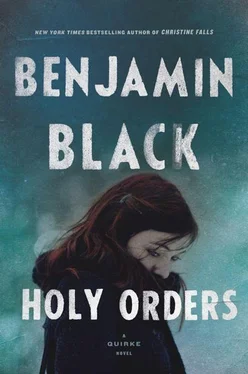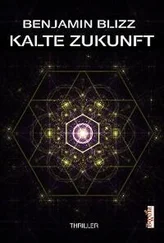David was speaking to Sally again. “You were twins,” he said. “I see. That must make it even harder for you.”
Sally took a deep breath. “Yes,” she said, “yes, it does.”
Tea. Bread. Little sandwiches. Biscuits. Phoebe ate, and drank, and tasted nothing. A wave of misery was welling up in her, unaccountably. Something was being lost — that was how it seemed: not that she was losing something, but that something was losing itself. What was it? She felt as if one whole side of her life were shearing off and toppling slowly into the sea.
She watched Sally’s small hands, slightly chafed and reddened, with their square-cut fingernails and milk-blue veins.
She remembered a lesson from her school days: amo, amas, amat . Love, yes. Amo, I love. But whom did she love?
David was leaning across the table to stub out his cigarette in the ashtray, and now he glanced back at her, sidelong, inquiringly, as if she had said something. Had she, without realizing it?
Lifting her cup to her lips, Sally smiled to herself, as if at some private remembrance. Phoebe studied her, her delicate, freckled skin, her hair the color of autumn leaves under water, those darkly luminous eyes. What had she and David been doing when Phoebe was in the bedroom, fetching her coat? What had passed between them, that the silence should seem so strange when Phoebe returned and they were standing there, David at the window with his back to the room and Sally in front of the mirror above the fireplace? Had they kissed, as she and Sally had kissed, in front of the gas fire, that night when the lightning struck?
Amo, amas, amat.
Amamus . We love.
The heavy evening rain had turned to mist, fine and light as cobweb, that did not so much fall as drift vaguely this way and that through the dense and glossy darkness. On Ailesbury Road each streetlight had its own penumbra, a large soft bright ball of filaments streaming outwards in all directions, and the lit windows of the houses were set in frames of the same muted yet luminous gray radiance. Quirke had told the taxi driver to drop him at the corner of Merrion Road, he was not sure why, and from there he had set off to walk up to the house, his hat pulled low on his forehead and the collar of his overcoat drawn tight around his neck. He had a scratchy sensation at the back of his throat. Was it the lingering effect of the poteen, or was it that malaise that had been threatening for days? The possibility that he was starting a cold or a dose of flu struck him as grimly comic. If he was dying, it seemed now that he would die sneezing.
He kept his eye warily on those streetlights with their furry halos. Over the past couple of days he had developed a new symptom of whatever it was that ailed him. It was not a matter of hallucinations, like the one he had experienced with the garrulous old majordomo at Trinity Manor, or when he had thought he had seen the lupine dog under the tinker’s caravan — no, this was more a notion, a concept, a menacing and ever-present potentiality. What he felt was that there was a light somewhere, jittery yet constant, shining urgently at him, which, however, he could not see and, he suspected, never would see. He knew what it was like, he could even describe it, were he to be called upon to do so: a circular white beam, intense yet somewhat diffused around the edges, and flickering, as if some component of the general apparatus, a taut, vertical wire, perhaps, were passing rapidly back and forth in front of it. It was off to his right, positioned in the middle distance, mounted, he thought, on a tripod or a tall slender pillar, or possibly a pole, but a rickety affair of some kind, anyway. Yet how could he know these things, how could he have even a general idea of them? For no matter how hard he tried to see it, whipping his eyes to the right suddenly to catch it off guard, as it were, the light always eluded him, always shifted on the instant, just beyond the margin of his vision. He was like, he thought, a dog chasing its own tail. There was no doubt that the light was his, that it had been set up and intended for him and him alone, but whether as guiding glow or a wrecking light he could not say.
He stopped at the house and opened the wrought-iron gate. The hinges, with the mist for lubricant, did not set up their usual screeching. He looked up; the windows were dark, upstairs and down, though there was a half-moon of light in the transom above the front door. He climbed the granite steps, noting the glinting flecks of mica in the wet stone. The bell jangled afar in the depths of the house. He had to wait a long time, the garden smells of loam and rained-on greenery heavy in his nostrils. The irritation in his throat was worsening steadily. He wondered if Mal would have any brandy in the house. There would be plenty of bourbon and gin, thanks to Rose, but it was brandy he needed tonight. Brandy, and other kinds of succor.
In the end it was Rose herself who opened the door to him. She was wearing slacks and a short jacket with enormous sleeves — a kind of kimono, was it? The light of the hall at her back made a haloed blaze in her dyed blond hair, reminding Quirke of the dandelion heads of the streetlamps.
“Quirke!” Rose exclaimed, sounding surprised and, it seemed, not entirely pleased.
Quirke took off his hat and shook raindrops like a scattering of jewels from the crown. “I phoned Mal this morning.”
“Yes, you did,” Rose said drily, in her slowest southern drawl. “But he forgot to tell me you were coming round. He forgets everything, these days. Come on in. You don’t look good.”
She took his hat and coat and hung them on a coat rack, and led him along the broad high hall, with its gleaming parquet and gilt chairs and massively framed ugly dark brown portraits of bewigged, puce-faced worthies of an age or ages long gone. The mansion had been the embassy of some minuscule European principality — Quirke could not remember which one — and when for some reason the mission had been abruptly withdrawn, Rose and Malachy had bought it as it stood, furnished, carpeted, complete with chandeliers and all manner of quaint and curiously lifeless bijouterie. Quirke could not think why they had wanted it. It would never be a home.
He watched Rose’s slim rear end as she walked ahead of him. She was still a handsome woman. He had gone to bed with her, once, a long time ago. Did Mal know about that? Would Rose have told him? But Rose and Mal, now — that was a conundrum Quirke knew he could never hope to crack.
“Have you had dinner?” Rose asked over her shoulder.
“Yes, I ate something,” Quirke said, though it was a lie.
“We just finished supper, Mal and I. These days, our evenings draw to a gentle close earlier and earlier. I think eventually we’ll find ourselves retiring for the night sometime around midafternoon.” She glanced back at him with an eyebrow lifted. “You do look terrible, Quirke.”
“I think I’m getting a cold.”
“Sure seems it’s going to be an awful bad one.”
They went through a green baize door and down three steps into a much narrower hallway. This had been formerly the servants’ quarters. “We’re living modestly, these days,” Rose said, and rolled her eyes.
She opened the door into what must have been the servants’ parlor, a low-ceilinged room of a brownish aspect, with a big oak table in the middle of the floor and framed and faded hunting prints on the walls. There was a single window, four square blank panes holding back the darkness. In a tiny grate in one corner a coal fire was burning. The air in the room was so warmly heavy that Quirke at once felt a headache starting up. The only light was that of a standing lamp beside the fireplace. Mal was sitting under the lamp in a ragged old green-upholstered armchair that sagged so low he seemed almost to be reclining on the floor. Now he put aside his newspaper and rose from the depths of the chair, uncoiling his long, angular frame — Quirke was reminded of the outsized wooden calipers that some Christian Brother in some institution long ago used to beat him with — and came forward, smiling, and fumbling with his rimless spectacles, which seemed to have got entangled somehow in his hair. “Quirke,” he said in greeting, “you’re looking well!”
Читать дальше












